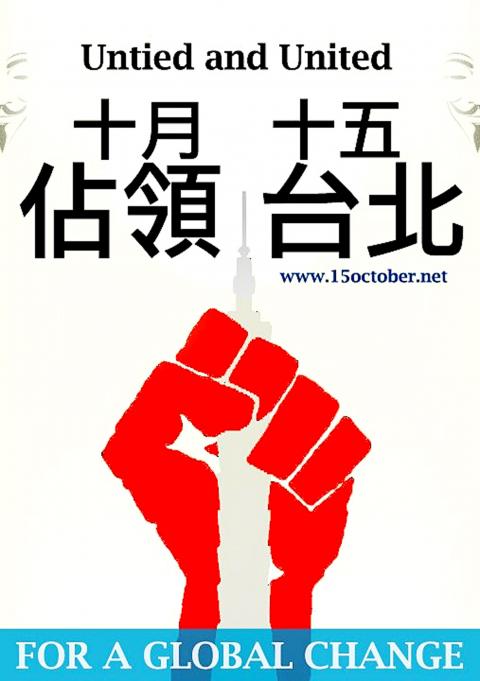The Occupy Wall Street protest that began on Sept. 17 in New York is spreading to Taiwan with Occupy Taipei (佔領台北), an event organized that takes place tomorrow outside Taipei 101, beginning at 1:01pm. As of yesterday, more than 1,400 people have said on the group’s Facebook page that they will join the event, which takes aim at social inequality and corporate greed. Although some foreign nationals have expressed concern that attending the protest may lead to arrest and possible deportation, the National Immigration Agency told the Taipei Times that foreign nationals who are legal residents of Taiwan could attend a protest if a permit has been applied for and granted six days before the protest date. As of Wednesday afternoon, the Xinyi Police Department had yet to receive an application from organizers. However, a message posted by co-organizer Kimba Vetten on the Occupy Taipei Facebook page said, “people who organize protests will be helping us and be informing people of their rights and what to say when police ask you questions. Taiwan hasn’t arrested protesters for a long time. Twenty years ago — yes, but not today. Anyway this is a peaceful gathering.”
■ Occupy Taipei (佔領台北), Taipei 101
■ Tomorrow beginning at 1:01pm

Photo courtesy of Occupy Taipei
■ On the Net: occupytaipei.tw

Dissident artist Ai Weiwei’s (艾未未) famous return to the People’s Republic of China (PRC) has been overshadowed by the astonishing news of the latest arrests of senior military figures for “corruption,” but it is an interesting piece of news in its own right, though more for what Ai does not understand than for what he does. Ai simply lacks the reflective understanding that the loneliness and isolation he imagines are “European” are simply the joys of life as an expat. That goes both ways: “I love Taiwan!” say many still wet-behind-the-ears expats here, not realizing what they love is being an

Google unveiled an artificial intelligence tool Wednesday that its scientists said would help unravel the mysteries of the human genome — and could one day lead to new treatments for diseases. The deep learning model AlphaGenome was hailed by outside researchers as a “breakthrough” that would let scientists study and even simulate the roots of difficult-to-treat genetic diseases. While the first complete map of the human genome in 2003 “gave us the book of life, reading it remained a challenge,” Pushmeet Kohli, vice president of research at Google DeepMind, told journalists. “We have the text,” he said, which is a sequence of

Every now and then, even hardcore hikers like to sleep in, leave the heavy gear at home and just enjoy a relaxed half-day stroll in the mountains: no cold, no steep uphills, no pressure to walk a certain distance in a day. In the winter, the mild climate and lower elevations of the forests in Taiwan’s far south offer a number of easy escapes like this. A prime example is the river above Mudan Reservoir (牡丹水庫): with shallow water, gentle current, abundant wildlife and a complete lack of tourists, this walk is accessible to nearly everyone but still feels quite remote.

It’s a bold filmmaking choice to have a countdown clock on the screen for most of your movie. In the best-case scenario for a movie like Mercy, in which a Los Angeles detective has to prove his innocence to an artificial intelligence judge within said time limit, it heightens the tension. Who hasn’t gotten sweaty palms in, say, a Mission: Impossible movie when the bomb is ticking down and Tom Cruise still hasn’t cleared the building? Why not just extend it for the duration? Perhaps in a better movie it might have worked. Sadly in Mercy, it’s an ever-present reminder of just